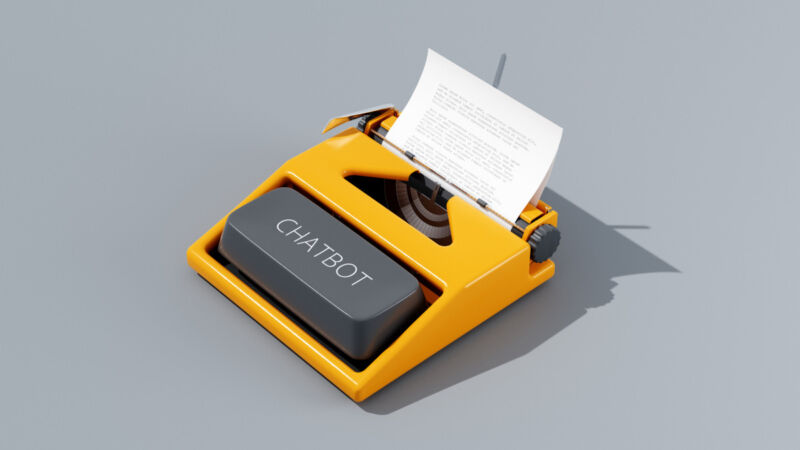
Over the weekend, the nonprofit National Novel Writing Month organization (NaNoWriMo) published an FAQ outlining its position on AI, calling categorical rejection of AI writing technology “classist” and “ableist.” The statement caused a backlash online, prompted four members of the organization’s board to step down, and prompted a sponsor to withdraw its support.
“We believe that to categorically condemn AI would be to ignore classist and ableist issues surrounding the use of the technology,” wrote NaNoWriMo, “and that questions around the use of AI tie to questions around privilege.”
NaNoWriMo, known for its annual challenge where participants write a 50,000-word manuscript in November, argued in its post that condemning AI would ignore issues of class and ability, suggesting the technology could benefit those who might otherwise need to hire human writing assistants or have differing cognitive abilities.
Writers react
After word of the FAQ spread, many writers on social media platforms voiced their opposition to NaNoWriMo’s position. Generative AI models are commonly trained on vast amounts of existing text, including copyrighted works, without attribution or compensation to the original authors. Critics say this raises major ethical questions about using such tools in creative writing competitions and challenges.
“Generative AI empowers not the artist, not the writer, but the tech industry. It steals content to remake content, graverobbing existing material to staple together its Frankensteinian idea of art and story,” wrote Chuck Wendig, the author of Star Wars: Aftermath, in a post about NaNoWriMo on his personal blog.
Daniel José Older, a lead story architect for Star Wars: The High Republic and one of the board members who resigned, wrote on X, “Hello @NaNoWriMo, this is me DJO officially stepping down from your Writers Board and urging every writer I know to do the same. Never use my name in your promo again in fact never say my name at all and never email me again. Thanks!”
In particular, NaNoWriMo’s use of words like “classist” and “ableist” to defend the potential use of generative AI particularly touched a nerve with opponents of generative AI, some of whom say they are disabled themselves.
“A huge middle finger to @NaNoWriMo for this laughable bullshit. Signed, a poor, disabled and chronically ill writer and artist. Miss me by a wide margin with that ableist and privileged bullshit,” wrote one X user. “Other people’s work is NOT accessibility.”
This isn’t the first time the organization has dealt with controversy. Last year, NaNoWriMo announced that it would accept AI-assisted submissions but noted that using AI for an entire novel “would defeat the purpose of the challenge.” Many critics also point out that a NaNoWriMo moderator faced accusations related to child grooming in 2023, which lessened their trust in the organization.
NaNoWriMo doubles down
In response to the backlash, NaNoWriMo updated its FAQ post to address concerns about AI’s impact on the writing industry and to mention “bad actors in the AI space who are doing harm to writers and who are acting unethically.”
We want to make clear that, though we find the categorical condemnation for AI to be problematic for the reasons stated below, we are troubled by situational abuse of AI, and that certain situational abuses clearly conflict with our values. We also want to make clear that AI is a large umbrella technology and that the size and complexity of that category (which includes both non-generative and generative AI, among other uses) contributes to our belief that it is simply too big to categorically endorse or not endorse.
Over the past few years, we’ve received emails from disabled people who frequently use generative AI tools, and we have interviewed a disabled artist, Claire Silver, who uses image synthesis prominently in her work. Some writers with disabilities use tools like ChatGPT to assist them with composition when they have cognitive issues and need assistance expressing themselves.
In June, on Reddit, one user wrote, “As someone with a disability that makes manually typing/writing and wording posts challenging, ChatGPT has been invaluable. It assists me in articulating my thoughts clearly and efficiently, allowing me to participate more actively in various online communities.”
A person with Chiari malformation wrote on Reddit in November 2023 that they use ChatGPT to help them develop software using their voice. “These tools have fundamentally empowered me. The course of my life, my options, opportunities—they’re all better because of this tool,” they wrote.
To opponents of generative AI, the potential benefits that might come to disabled persons do not outweigh what they see as mass plagiarism from tech companies. Also, some artists do not want the time and effort they put into cultivating artistic skills to be devalued for anyone’s benefit.
“All these bullshit appeals from people appropriating social justice language saying, ‘but AI lets me make art when I’m not privileged enough to have the time to develop those skills’ highlights something that needs to be said: you are not entitled to being talented,” posted a writer named Carlos Alonzo Morales on Sunday.
Despite the strong takes, NaNoWriMo has so far stuck to its position of accepting generative AI as a set of potential writing tools in a way that is consistent with its “overall position on nondiscrimination with respect to approaches to creativity, writer’s resources, and personal choice.”
“We absolutely do not condemn AI,” NaNoWriMo wrote in the FAQ post, “and we recognize and respect writers who believe that AI tools are right for them. We recognize that some members of our community stand staunchly against AI for themselves, and that’s perfectly fine. As individuals, we have the freedom to make our own decisions.”











![ROSE IN DA HOUSE I BE MY BOYFRIENDS 2 [OFFICIAL TRAILER]](https://cherumbu.com/wp-content/uploads/2022/01/ROSE-IN-DA-HOUSE-I-BE-MY-BOYFRIENDS-2-OFFICIAL-150x150.jpg)

